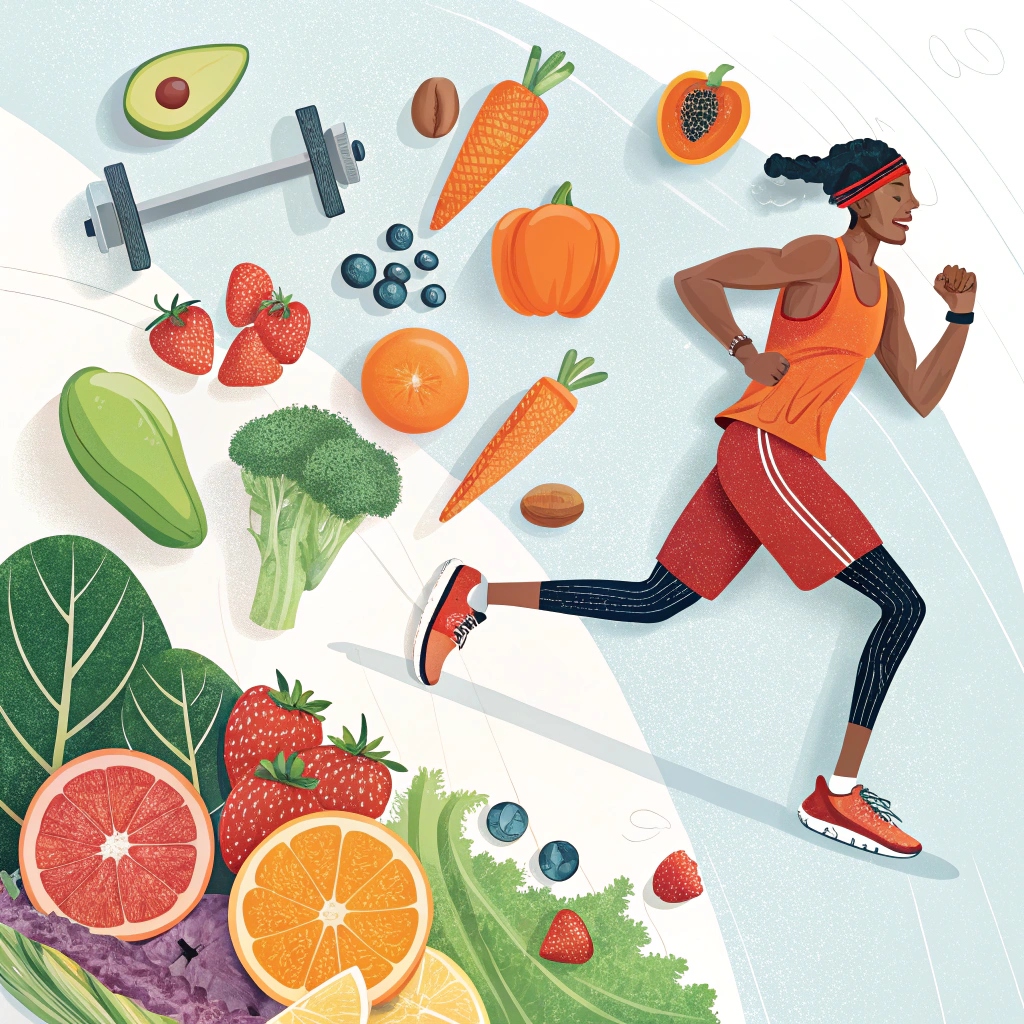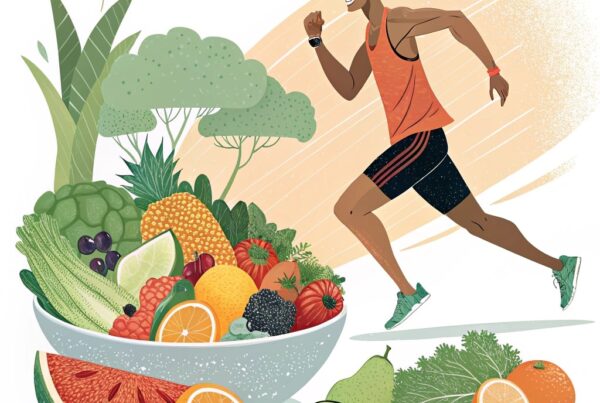Are you pushing yourself harder than ever before? Training relentlessly, chasing peak performance?
But what if your efforts are being undermined – silently sabotaged – by a hidden enemy within your own body? It’s not about more training; it’s about how you fuel that training.
Too many athletes and high-achievers focus solely on pushing through the pain, ignoring the root cause of fatigue and slow recovery.
Imagine consistently feeling energized, recovering faster after intense workouts, and sharpening your mental acuity – all while optimizing your performance.
That’s exactly what I’m going to reveal today. The surprising connection between diet and peak performance, and how adopting an anti-inflammatory approach can unlock a whole new level of potential.
Optimizing Human Potential
Do you ever feel like pushing harder actually slows your progress? Like no matter how much effort put in, results just aren’t quite there?
That familiar ache after a workout, or that foggy feeling when trying to focus – it’s often not about lack of training or study time. It’s frequently fueled by hidden inflammation within the body.
Elite athletes and top performers don’t just rely on intense training; they meticulously manage their recovery through nutrition designed to minimize this internal disruption.
The key isn’t simply about fueling muscles, but about nourishing systems that support peak performance at every level.
Every sugary snack or processed meal is adding another layer of inflammation, hindering the body’s natural repair processes and diminishing potential.
But here’s what most health experts don’t emphasize enough: optimizing your diet can be a far more powerful tool for unlocking human potential than any supplement or advanced technique.
Let’s explore how specific dietary choices can dramatically accelerate recovery and sharpen mental clarity – starting now.
Inflammation’s Stealth Attacks
Imagine your body is a high-performance machine – sleek, powerful, and built for speed. But what happens when that machine starts experiencing friction? That’s essentially what inflammation represents. It’s not always visible, but it can be silently attacking your ability to recover and perform at your best.
Inflammation is a natural process; you wouldn’t expect a car engine to run perfectly without any wear and tear. However, chronic, low-grade inflammation – the kind that’s constantly simmering in your system – can significantly hinder recovery after intense physical activity or even impact cognitive function.
Think of it like this: when you push yourself hard during a workout, muscle fibers get damaged. The body responds by initiating an inflammatory response to repair those tissues. This is crucial for rebuilding stronger muscles. But if that inflammation doesn’t resolve quickly – perhaps due to a diet high in processed foods or lacking key nutrients – it can disrupt the healing process, leading to prolonged soreness and reduced performance.
Furthermore, this constant inflammatory state isn’t just affecting your physical recovery; it’s also impacting brain health. Studies are increasingly showing a link between chronic inflammation and cognitive decline, memory problems, and even mood disorders.
The body’s immune system is constantly battling foreign invaders, and this process generates inflammatory compounds. While short-term inflammation is beneficial, consistently elevated levels can damage brain cells and impair neural function, slowing down your thinking and potentially affecting concentration.
The Body’s Silent Battles
It’s easy to think about athletic performance as simply pushing harder during training. But your body is constantly engaged in a silent battle – one against inflammation. You see, intense physical activity creates microscopic damage within tissues, triggering an inflammatory response. This isn’t necessarily bad; it’s part of the repair process. However, when this inflammation becomes chronic and unresolved, it can significantly hinder recovery and even impact cognitive function.
This constant state of low-grade inflammation – often referred to as “metaflammation” – is linked to a number of issues.
Think about delayed muscle repair after a tough workout or the persistent soreness that can linger long after you’ve finished training. This prolonged inflammation interferes with the body’s ability to rebuild and strengthen tissues effectively. It slows down healing, increases pain sensitivity, and ultimately impacts performance. The key is minimizing this ongoing inflammatory response.
The foods you consume play a huge role in modulating this inflammatory process.
Certain dietary patterns – like those rich in processed foods, refined sugars, and unhealthy fats – tend to fuel inflammation. Conversely, a diet abundant in anti-inflammatory nutrients can help dampen down the response, allowing your body to recover more efficiently.
Gut-Brain Axis Revealed
With the gut-brain axis revealed, it’s fascinating to consider how your diet directly impacts your performance. You see, your digestive system isn’t just processing food; it’s a major communication hub for your entire body – including your brain!
The gut-brain axis is essentially a two-way street of information exchange between the trillions of bacteria living in your intestines and your central nervous system. These microbes produce neurotransmitters—chemicals that control mood, motivation, and even pain perception.
Think about it: when you eat a diet rich in processed foods and sugar, those gut bacteria flourish on unhealthy compounds, leading to inflammation throughout your body – including the brain. This can make you feel sluggish, foggy-headed, and less able to recover after intense training.
Conversely, an anti-inflammatory diet—packed with colorful fruits, vegetables, lean proteins, and healthy fats—feeds beneficial gut bacteria that produce calming neurotransmitters like serotonin and GABA. These help reduce anxiety and improve focus.
Essentially, you’re fueling your brain for peak performance by nourishing the tiny ecosystem in your gut. It’s a powerful connection – one that can dramatically impact how quickly you recover after a workout or sharpen your mental acuity.
Fueling Recovery Pathways
When your body is battling intense exercise, it creates inflammation. This can slow down recovery and impact brainpower too.
Focusing on foods that fight inflammation helps you bounce back faster from workouts—think colorful fruits and veggies!
Berries are packed with antioxidants that combat those nasty free radicals produced during intense activity. Leafy greens provide vital nutrients to repair muscle tissue, helping you rebuild stronger after a tough session.
You’ll find that incorporating healthy fats—like avocados and olive oil—supports brain function and reduces inflammation too.
These fats are crucial for cell membranes and hormone production, which play a key role in how your body responds to stress and recovers from physical exertion.
Essentially, nourishing your system with anti-inflammatory foods is the perfect strategy for optimizing both athletic recovery and mental sharpness—a winning combination!
Nutrient Timing Strategies
Yes, optimizing your nutrition around workouts is key for boosting recovery and sharpening mental performance. It’s not just about *what* you eat, but *when*.
Timing meals and snacks strategically can significantly impact how your body repairs itself and fuels its functions. Think of it like giving your muscles the right building blocks at the precise moment they need them most.
For example, consuming carbohydrates after a tough training session replenishes glycogen stores – that’s the energy your muscles use – helping you bounce back faster. Similarly, protein helps repair muscle tissue damage.
Nutrient timing around workouts can also enhance brainpower. Consuming healthy fats and complex carbs before an intense workout provides sustained energy for optimal cognitive function.
Consider a small snack of nuts and fruit about 90 minutes prior to training – this can sharpen focus and improve reaction time. This simple strategy makes a huge difference.
Essentially, carefully planning your meals around workout times— focusing on carbs for energy and protein for repair—is a powerful tool for maximizing athletic performance and cognitive function.
Beyond Antioxidants – Modulation
Beyond antioxidants – modulation refers to how your diet influences more than just fighting off damage. It’s about actively shaping your body’s response to training and mental challenges.
Think about it this way: Antioxidants are like a first responder, tackling immediate damage. But modulation is the architect building a stronger foundation.
It’s about controlling inflammation – not just stopping it, but directing where your body focuses its energy. A diet rich in omega-3 fatty acids, for example, can shift that inflammatory response towards repair and rebuilding muscle tissue after intense workouts.
This modulation is also key to brainpower! The way you fuel your body impacts cognitive function – focus, memory, even creativity.
Certain foods support the production of neurotransmitters like dopamine and serotonin, which are crucial for mood and mental clarity. Modulation isn’t just about physical recovery; it’s about optimizing your brain’s performance too.
So, while antioxidants are important, modulation is about taking control – shaping your body’s response to stress and maximizing its potential for peak performance and cognitive sharpness.
Specific Anti-Inflammatory Foods
What if a simple change in your diet could dramatically improve how quickly *you* recover after intense workouts or sharpen your mental focus? It’s not just wishful thinking – anti-inflammatory foods can be a game changer. Let’s dive into some specific choices that can fuel your performance like never before.
The truth is, exercise and demanding cognitive tasks create inflammation in the body. This isn’t necessarily bad; it’s part of the repair process. However, excessive or chronic inflammation hinders recovery and brain function. Focusing on foods rich in anti-inflammatory compounds can help manage this response and optimize your results. Here are some key players to incorporate into *your* diet:
Fatty Fish – Salmon, mackerel, and tuna are packed with omega-3 fatty acids. These fats have powerful anti-inflammatory properties that reduce muscle soreness and support brain health. Think of them as tiny repair crews for your body after a tough training session.
Berries – Blueberries, strawberries, raspberries, and blackberries are bursting with antioxidants, particularly anthocyanins. These compounds combat oxidative stress caused by exercise, protecting cells from damage and promoting faster healing. Adding these to smoothies or snacks is a simple way to boost your recovery.
Leafy Greens – Spinach, kale, and collard greens are nutritional powerhouses. They’re loaded with vitamins, minerals, and antioxidants that help reduce inflammation throughout the body. Incorporating them into salads or cooking meals can provide significant benefits for *you*.
Turmeric – This vibrant spice contains curcumin, a potent anti-inflammatory compound. Curcumin has been shown to accelerate muscle recovery, alleviate pain, and even boost brain function. Adding it to smoothies, soups, or curries is an easy way to reap its benefits.
Strategic Dietary Protocols
After understanding that fueling your body strategically can boost athletic recovery and brainpower, let’s talk about dietary protocols.
Focusing on an anti-inflammatory diet is key to optimizing performance— it’s all about providing the right building blocks for repair and regeneration.
Think of foods rich in antioxidants like berries, leafy greens, and turmeric. These combat those nasty free radicals that contribute to muscle soreness and brain fog after intense activity or mental exertion. Also, consider incorporating healthy fats— avocados, nuts, and olive oil— which are crucial for hormone production and reducing inflammation.
Strategic timing of nutrient intake is also important – fueling your body when it needs the most support.
Immediately post-workout, you need protein and carbohydrates to kickstart muscle repair and replenish glycogen stores. A blend of whey protein and a fast-digesting carb source like fruit can be incredibly effective. And don’t forget hydration— water is absolutely essential for every bodily function, including recovery!
Essentially, this strategic dietary approach – prioritizing anti-inflammatory foods and timing nutrient intake – helps you recover faster, sharpen your mental focus, and unlock your full potential.
Performance Enhancement Mechanisms
When your body is inflamed, it’s like a constant battle going on within. It’s impacting how efficiently you recover after intense training or even just a demanding day.
This inflammation interferes with key processes that are vital for performance – think energy production and muscle repair. If the system isn’t working smoothly, your body can’t rebuild itself as effectively.
Consider this: When you push yourself hard, micro-tears develop in your muscles. Without proper anti-inflammatory support, those tears take longer to heal, leading to soreness and reduced training capacity. Similarly, brain function relies on efficient energy pathways – inflammation can disrupt these pathways, impacting focus and cognitive performance. An anti-inflammatory diet helps optimize these processes by providing your body with the tools it needs to manage swelling and promote healing. It’s about fueling a state of resilience, not just recovery.
An anti-inflammatory diet helps optimize these processes by providing your body with the tools it needs to manage swelling and promote healing. It’s about fueling a state of resilience, not just recovery.
Foods rich in antioxidants – like berries and leafy greens – combat free radicals that contribute to inflammation. Similarly, incorporating healthy fats—such as those found in avocados and olive oil—helps reduce systemic inflammation throughout the body.
Ultimately, an anti-inflammatory diet isn’t just about feeling good; it’s a strategic investment in maximizing your physical and mental performance – allowing you to train harder, recover faster, and achieve peak potential.
Cognitive Boosts – The Link
People often think about fueling athletic performance simply through protein and carbohydrates. But there’s a deeper connection—a link between what you consume and how your brain recovers after intense activity.
This is where anti-inflammatory diets come into play. When you push yourself physically, especially during high-intensity training, it creates inflammation throughout the body – including the brain.
Think of it like this: a marathon runner’s muscles are damaged and inflamed. But your brain also experiences similar cellular stress. This can impair cognitive function—making it harder to focus, learn, or even just feel mentally sharp.
The foods you choose directly impact the level of inflammation in your system. Foods rich in antioxidants – like berries, leafy greens, and fatty fish – help combat this inflammatory response, allowing for quicker brain repair.
Essentially, by prioritizing an anti-inflammatory diet, you’re providing your brain with the tools it needs to recover faster and more effectively from physical exertion—leading to enhanced cognitive performance.
Personalized Anti-Inflammatory Approaches
Many people recognize that fueling performance goes beyond simply eating a balanced diet. You see, your body’s response to food can vary significantly from person to person – it’s about understanding how *you* react to different nutrients.
Consider the impact of inflammation on athletic recovery and cognitive function. Intense physical activity and mental exertion generate inflammatory responses within the body. These responses are, in essence, a natural part of the healing process. However, chronic or excessive inflammation can hinder this recovery and impair brainpower.
What’s key is recognizing that what’s anti-inflammatory for one person might not be for another. For example, someone with sensitivities to dairy could experience increased inflammation when consuming it regularly, while another person doesn’t notice any adverse effects. Similarly, certain foods rich in antioxidants – like berries or leafy greens – can powerfully combat inflammation for some, but may not have the same effect on others due to genetic variations or gut microbiome differences.
This is where a personalized approach becomes crucial. You need to explore your body’s unique responses through careful observation and tracking.
Start by noting how you feel after eating different foods – paying attention to energy levels, mood, sleep quality, and any signs of inflammation like joint pain or digestive discomfort. Keeping a food diary can be incredibly helpful in identifying potential triggers. Then, consider incorporating strategies tailored to your specific needs, such as experimenting with anti-inflammatory spices like turmeric or ginger, or focusing on foods that support a healthy gut microbiome – both of which play significant roles in regulating inflammation.]
Sustainable Athletic & Mental Fuel
Through fueling your body correctly, you can significantly enhance athletic recovery and boost brainpower. Let’s explore how an anti-inflammatory diet plays a crucial role in achieving this.
Athletes often experience intense inflammation after strenuous activity – think muscle soreness, swelling, and delayed onset muscle soreness (DOMS). This is your body’s natural response to repair tissue damage. However, chronic inflammation can hinder recovery and performance.
An anti-inflammatory diet focuses on foods that actively combat this inflammation. Think vibrant fruits and vegetables rich in antioxidants like berries, leafy greens, and brightly colored peppers. These help neutralize damaging free radicals produced during exercise. Consuming lean protein sources – fish, chicken, beans – further supports muscle repair by providing the building blocks needed for tissue regeneration.
Beyond athletic recovery, this dietary approach can also profoundly impact cognitive function. The brain is particularly vulnerable to inflammation, and reducing it may enhance focus, memory, and overall mental clarity.
Incorporating foods like fatty fish (salmon, tuna) – rich in omega-3 fatty acids – and turmeric (a potent anti-inflammatory spice) can contribute to a healthier brain environment. Similarly, prioritizing whole grains over refined carbohydrates helps stabilize blood sugar levels, preventing energy crashes that negatively affect concentration.
Unlock Your Peak Potential: It’s More Than Just Sweat!
Optimal performance isn’t just about pushing harder; it’s fundamentally linked to how well your body and mind recover.
The science is increasingly clear – chronic inflammation can seriously hinder both athletic recovery and cognitive function. An anti-inflammatory diet, rich in colorful fruits and vegetables, healthy fats like omega-3s, and lean protein, actively combats this internal battle. By reducing systemic inflammation, the body’s repair mechanisms become significantly more efficient, allowing muscles to rebuild stronger and faster after intense activity. Similarly, a brain shielded from inflammatory damage experiences enhanced focus, improved memory, and greater mental clarity.
Shifting towards an anti-inflammatory approach isn’t about restrictive dieting; it’s about fueling your body with the resources it truly needs to thrive. Small changes – swapping processed foods for nutrient-dense options – can make a huge difference in how you feel, both physically and mentally. It’s about investing in sustained performance and long-term well-being.
Start nourishing your body today with the power of anti-inflammation. Embrace this simple yet profound strategy and witness the remarkable transformation it unlocks – a stronger physique, sharper mind, and a truly elevated level of achievement.




